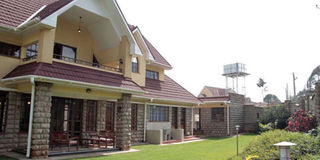Rents highest in Rosslyn, Nyari

Rosslyn Springs for sale in Rosslyn on July 30, 2015. You need an income of more than Sh1 million to rent a house in the Rosslyn or Nyari suburbs of Nairobi County. PHOTO | DIANA NGILA
What you need to know:
- Among the most expensive satellite towns in terms of rent are Ngong, Ruaka and Rongai.
- Cytonn says that, with most Nairobi residents unable to afford mortgages for areas they would want to live in, the next best option is renting.
You need an income of more than Sh1 million to rent a house in the Rosslyn or Nyari suburbs of Nairobi County.
Real estate and investment firm Cytonn has classified the two areas as the priciest, edging out Muthaiga and Runda, which have long been associated with old money and the most powerful figures in government and business.
The survey by the company, however, notes that rents are affordable in most areas of Nairobi for households earning between Sh50,000 and Sh150,000 a month.
“The only place requiring more than a Sh1 million monthly income to afford rent is Nyari/Rosslyn, with most areas requiring an income range of Sh50,000-150, 000 to afford rental rates,” the firm says.
Those with dreams of renting in Karen, Kitusuru, Muthaiga, Ridgeways, Riverside, Runda, Spring Valley, and Westlands should, ideally, have a monthly income of between Sh300,000 and Sh1 million.
AFFORDABLE MORTGAGE
Falling in the tier below that are households earning between Sh150,000 and Sh300,000, which would be best suited to live in Kilimani and Kileleshwa.
Those in the Sh50,000 to Sh150,000 bracket have the largest choice of neighbourhoods. Cytonn lists Buruburu, Dagoretti, Donholm, Kahawa, Kasarani, Kikuyu, Lang’ata, Ngong, Rongai, Ruaka, South B and C, Umoja as ideal for this group.
Below that are the estates in Athi River, Embakasi, Githurai, Kariobangi, Kitengela, Komarock and Ruai for households earning less than Sh50,000.
Among the most expensive satellite towns in terms of rent are Ngong, Ruaka and Rongai.
Cytonn says that, with most Nairobi residents unable to afford mortgages for areas they would want to live in, the next best option is renting.
“The major reasons behind this are low income levels that cannot service a mortgage, high property prices, and high interest rates, which discourage potential homeowners from borrowing,” the firm says.
“Consequently, Nairobi and the metropolis area still remain largely a rental market. This also explains why most real estate developments are bought by real estate investors, who in turn rent them out to households.”
Data from the Central Bank of Kenya last year indicated that the average size of mortgages increased to Sh7.5 million, making it difficult for the majority of Kenyans to own homes financed by commercial banks.
The lack of affordable mortgage has seen most people opt to pay cash for a house, or buy land and build homes over a period of time.
This has contributed to rapid growth of the satellite towns, where land is cheaper than in the city, and gives those who do not wish to rent an opportunity to build their homes incrementally.




